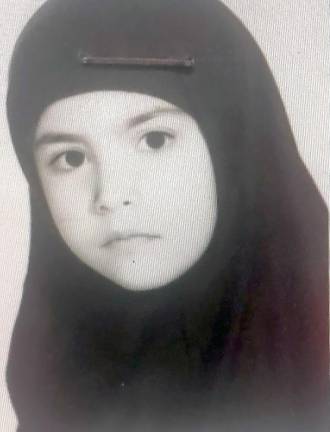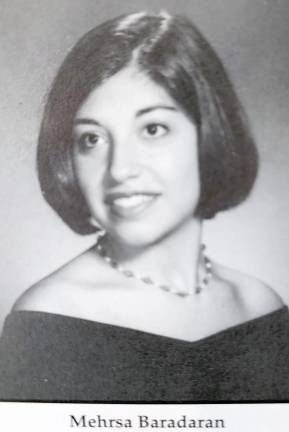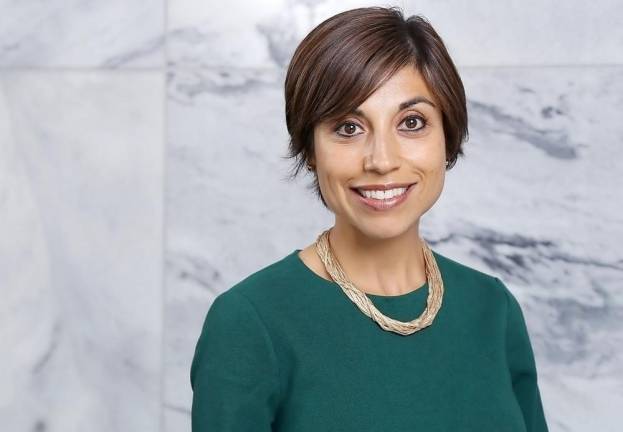An immigrant’s story
Goshen. Mehrsa Baradaran went from being forced to shout ‘Death to America’ twice a day as a child in Iran to ‘I pledge allegiance’ in classrooms in Goshen. Today, she is part of President-elect Joe Biden’s transition team.



Mehrsa Baradaran, a refuge from Iran who found a welcome in Goshen, has been tapped to advise President-Elect Joe Biden’s transition.
Baradaran, a 1996 graduate of Goshen High School, recalled in a 2017 Slate column that she was forced to shout “Death to America” twice a day with her classmates at her Iranian grade school.
In just a few years, however, she was pledging allegiance in an American classroom to the flag of the United States.
In 2001, she became a citizen, proudly taking an oath renouncing allegiance to any foreign state or potentate and binding her to “support and defend the Constitution and laws of the United States of America against all enemies, foreign and domestic.”
The naturalization ceremony in an Orange County courtroom was “wonderful,” she said. “There were so many people there.”
An expert on banking and the ‘weath gap’
Baradaran, 42, is an expert on banking who teaches law and is an associate dean at the University of California, Irvine. She has written two books – “The Color of Money: Black Banks and the Racial Wealth Gap” and “How the Other Half Banks: Exclusion, Exploitation and the Threat to Democracy" - and numerous articles in scholarly and popular publications. She has given lots of interviews, testified before Congress and advised progressive politicians like Elizabeth Warren.
She is a passionate foe of the “wealth gap,” a condition that is reflected in the fact that median income for Black families in 2019 was $24,100, compared to $188,200 for white families.
Baradaran argues that this disparity is the product of centuries of discrimination. “Systemic racism is everywhere,” she said. “No town is exempt. It’s usually most obvious to see in neighborhood segregation patterns.”
One of 500 ‘experienced and talented professionals’
Baradaran was approached to serve as a volunteer on two agency review teams created by the Biden transition: one to review Treasury Department policies and infrastructure and the other to dig into the Federal Reserve and securities regulation.
According to the transition website, the teams, made up of 500 “experienced and talented professionals,” will work to understand “the operations of each agency, ensuring a smooth transfer of power, and preparing for President-elect Biden and Vice President-elect (Kamala) Harris and their cabinet to hit the ground running on Day One.”
Views are well known
Baradaran has been told not to talk about her work on the transition, but her views are well known. For example, she supports a proposal to let the post office offer low- and middle-income clients mortgages, credit cards and other banking services they have been denied at traditional financial institutions.
She also believes that the Black community is entitled to reparations to compensate for the majority’s failure, time and again, to fulfill its promises to provide equal protection and equal rights.
“We embedded racism into policy,” she told the Huffington Post in June. “And how do you get that out? How do you fix that? I think reparations is the only answer.”
Her parents opposed Iran’s cleric-dominated regime
Baradaran’s father Asad, a neurologist, and her mother Narima were opponents of Iran’s cleric-dominated regime; her daughter recalled in her Slate column that Narima was a political prisoner for three years. The family was forced to dodge air raids that killed thousands during the Iran-Iraq War.
The family was permitted to leave Iran in 1986 when Mehrsa was 9, her sister Shima 7 and her sister Hediyeh 1. (A son, Darius, was born in the United States).
Mehrsa didn’t speak a word of English when she arrived - Farsi was her first language - but quickly picked up it up with the help of television in America.
The family joined the Church of Jesus Christ Of Latter-Day Saints (LDS) shortly after arriving in Los Angeles. Mehrsa was doing Spanish-speaking missionary service in Houston, Texas, a rite of passage for young Mormons, when she was notified that her citizenship papers had come through.
In an interview with The Deseret News, Baradaran said: “For us, the church was America. When we came to America as refugees, in 1986, the very first people who embraced us were Latter-Day Saints who were open-minded and open-hearted. We were from a terrorist country then, but the church didn’t care.”
To settle in Goshen
The Baradarans came to America with few possessions. They moved around a lot as Asad worked to obtain credentials to practice medicine in the United States. They finally settled in Goshen and Asad was able to open a practice in Middletown; he retired several years ago and now lives with his wife in California.
All of the siblings graduated from Goshen schools. Like her big sister, Shima is a law professor. Hediyeh is a doctor and Darius is applying to medical school.
Goshen was “so calm and peaceful and beautiful,” said Mehrsa, who started high school in 10th grade. “It was a huge change because we had lived in urban areas.”
They were the only Iranians in town and one of the few minorities of any kind. But they encountered no hostility, unlike in some of the places they had lived. Baradaran made friends quickly and talked with them about her Iranian roots.
“They all knew,” she said. “I didn’t get the sense that they really cared. I think most people were familiar with Iraq because of Desert Storm so a lot of people assumed it was the same country.”
She marveled at her parents’ work ethic and enjoyed her Advanced Placement courses, but “I was not a good high school student. I did not get straight As and I did not really try hard in class at all. I was more interested at the time in having friends than succeeding.”
Baradaran enrolled in Brigham Young University after graduation as a pre-med student but eventually decided to become a lawyer. She earned her law degree at New York University and, before she began her teaching career, worked at a Wall Street law firm during the financial crisis, concluding that banking was all “smoke and mirrors.”
‘Yearning to breathe free’
Baradaran was dismayed when President Trump, shortly after he took office, announced plans to bar the entry of Iranians and inhabitants of several other Muslim countries from entering the U.S. On Twitter and in her Slate column she urged the U.S. not to abandon those who, like she had been, were “yearning to breathe free.”
“I understand that America took a risk on us. Every immigrant, every refugee, is a risk,” she wrote in Slate. “But I believed in America, and it believed in me. In America, my sisters and I stopped seeing dead bodies in the street.
“I always get plenty of hate email after those things but people I knew were very supportive,” she said. “A bunch of my high school classmates shared it with some positive commentary afterwards, which meant a lot to me.”
“I understand that America took a risk on us. Every immigrant, every refugee, is a risk. But I believed in America, and it believed in me. In America, my sisters and I stopped seeing dead bodies in the street.”
Mehrsa Baradaran writing in Slate magazine